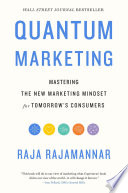

Quantum Marketing emphasizes the transition from traditional marketing paradigms to a more dynamic, interconnected approach that leverages the principles of quantum physics. Traditional marketing often operates on linear models, focusing on demographics and predictable consumer behavior. In contrast, Quantum Marketing recognizes the complexity and unpredictability of consumer behavior in a digital age, where interactions are non-linear and influenced by multiple factors. This shift requires marketers to adapt their strategies to be more agile, data-driven, and responsive to real-time consumer insights. By embracing this new paradigm, businesses can create more personalized and effective marketing campaigns that resonate with today's consumers.
Continue readingIn Quantum Marketing, data is viewed as the new currency, driving decision-making and strategy formulation. The book stresses the importance of collecting, analyzing, and utilizing data to understand consumer behavior and preferences better. As consumers engage with brands across various platforms, they leave behind a digital footprint that can be harnessed to create targeted marketing strategies. The ability to interpret this data effectively allows marketers to anticipate consumer needs, personalize experiences, and optimize campaigns for maximum impact. This idea underscores the necessity for organizations to invest in data analytics tools and cultivate a data-centric culture to thrive in the modern marketing landscape.
Continue readingQuantum Marketing posits that emotional connections are paramount in establishing brand loyalty. In an era where consumers are bombarded with advertising messages, brands that resonate emotionally are more likely to capture attention and foster loyalty. The book discusses various strategies for creating emotional connections, such as storytelling, authenticity, and community engagement. By understanding the emotional triggers that influence consumer decisions, marketers can craft messages and experiences that resonate on a deeper level. This approach not only enhances brand loyalty but also encourages word-of-mouth marketing, as satisfied customers share their positive experiences with others.
Continue readingTechnology plays a crucial role in the evolution of marketing strategies, as highlighted in Quantum Marketing. The book explores how advancements in artificial intelligence, machine learning, and automation are transforming the marketing landscape. These technologies enable marketers to analyze vast amounts of data, automate repetitive tasks, and deliver personalized content at scale. Additionally, the rise of social media and digital platforms has changed the way brands interact with consumers, making it essential for marketers to embrace these technologies to stay competitive. The integration of technology into marketing strategies not only enhances efficiency but also allows for more innovative and engaging consumer experiences.
Continue readingIn the fast-paced world of marketing, agility and adaptability are key themes in Quantum Marketing. The book emphasizes that marketers must be prepared to pivot their strategies in response to changing consumer behaviors and market dynamics. This requires a mindset that embraces experimentation and continuous learning. By adopting agile methodologies, marketers can test new ideas, gather feedback, and iterate quickly to optimize their campaigns. The ability to adapt to unforeseen challenges, such as economic shifts or technological disruptions, is critical for long-term success in the ever-evolving marketing landscape.
Continue readingQuantum Marketing advocates for a consumer-centric approach, where understanding the consumer's journey is paramount. The book outlines the importance of mapping out the customer journey to identify touchpoints and opportunities for engagement. By prioritizing the consumer's needs and preferences, marketers can create tailored experiences that enhance satisfaction and drive conversions. This approach involves leveraging insights from data analytics to inform strategy and ensuring that every interaction adds value to the consumer. A consumer-centric strategy not only fosters loyalty but also positions brands as trusted partners in the consumer's decision-making process.
Continue readingThe book addresses the growing importance of sustainability and ethical practices in marketing. Quantum Marketing highlights that consumers are increasingly making purchasing decisions based on a brand's commitment to social responsibility and environmental sustainability. Marketers are encouraged to integrate ethical considerations into their strategies, ensuring transparency and authenticity in their messaging. Brands that prioritize sustainability not only appeal to conscious consumers but also differentiate themselves in a crowded marketplace. This focus on ethical marketing practices fosters trust and loyalty, as consumers are more likely to support brands that align with their values.
Continue readingThe reading time for Quantum Marketing depends on the reader's pace. However, this concise book summary covers the 7 key ideas from Quantum Marketing, allowing you to quickly understand the main concepts, insights, and practical applications in around 24 min.
Quantum Marketing is definitely worth reading. The book covers essential topics including The Shift from Traditional to Quantum Marketing, Data as the New Currency, Emotional Connection and Brand Loyalty, providing practical insights and actionable advice. Whether you read the full book or our concise summary, Quantum Marketing delivers valuable knowledge that can help you improve your understanding and apply these concepts in your personal or professional life.
Quantum Marketing was written by Raja Rajamannar.
If you enjoyed Quantum Marketing by Raja Rajamannar and want to explore similar topics or deepen your understanding, we highly recommend these related book summaries:
These books cover related themes, complementary concepts, and will help you build upon the knowledge gained from Quantum Marketing. Each of these summaries provides concise insights that can further enhance your understanding and practical application of the ideas presented in Quantum Marketing.